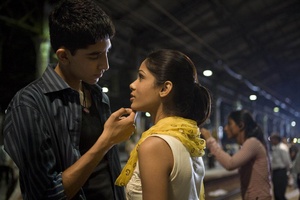Think of your life as a soundtrack.
You have a song that turns up when you know you’re about to discover something big. A different song plays when your world seems to crumble down, and another song emerges out of nowhere along with the butterflies that suddenly ram against the walls of your tummy.
“Nick and Norah’s Infinite Playlist” by David Levithan and Rachel Cohn reads exactly like that, except the soundtrack is shared by two people who are thrown into each other’s lives with an unexpected springboard of a rash kiss. Told in alternating “he said, she said” narration, a story of love, music and friendship unfolds in one, long roller coaster of a first date in Manhattan.
I was enticed to read “Nick and Norah’s Infinite Playlist” when I found out the idea was born one afternoon while two of my favorite authors were out for lunch. Levithan and Cohn shared a passion for teen literature and music for many years. Cohn told Levithan she’d been stirring a story idea around her head where two youngsters would meet at a music club in Manhattan. Without more said on the matter, Levithan agreed to help Cohn begin her novel.
Months went by, and Cohn had almost forgotten about the conversation when she received an email from Levithan with the words “Chapter One” in the subject line. From there, the two emailed chapters back and forth, picking up each chapter where the other left off. Nick and Norah’s story slowly came to life.
Cohn and Levithan have a magical talent that I previously thought was only the province of John Green: they get teenagerdom right. They write the characters as perfect portrayals of the teenagers they really are.
I’ve encountered a lot of books where teens sound how the authors wish them to sound. One classic example — committed by most female young adult authors (I’m looking at you, Stephanie Meyers) — is they make teenage boys sound like their ideal 30-year-old men. They’re not fleshing out characters when they do that; they’re just making use of puppets molded by their dreamy notions and frustrations.
That’s not the case with Nick or Norah.
Norah meets Nick at a club in downtown Manhattan. Nick is stuck in his usual, emo-depressed state due to his recent break-up with Tris, who had inspired him to write beautiful songs. Norah comes from a bad relationship with a very politically-oriented boyfriend, Tal, whom she’d dumped about five times in the last three years. Both stories offer an element of truth that any reader can relate to.
This is why I think the Cohn-Levithan duo is such an exquisite collaboration. They are so in-sync with each other that you can only wonder how they can flawlessly make the story go on, yet you know who’s penned what because of their distinctive styles. Admittedly, I’ve only read one other book by Cohn, but Levithan’s writing had the undertones of his “Will Grayson, Will Grayson” and “Boy Meets Boy” that are recognizable by his fans.
I’m not easily impressed by most love stories, but this novel thawed my frosty literary heart from the first page. Some parts of the story were actually painful to read — not because they were bad or wrong, but because they were so right that they were touching raw, emotional spots leftover from teenager-hood that I didn’t realize I still had. Like when Norah decided to jump the turnstile to catch the train with Nick, it’s those same leaps of faith that reminded me of the leaps I took as a teen that got me to where I am now.
Even though readers may personally feel like they’re nothing like Nick and Norah, the emotions and sensations they go through are so familiar that I’d wager they’re universal.
If this novel is an album, the listeners will encounter a lot of songs about strippers in nun costumes, taxi driver wisdom, five-minute relationships and heart-versus-mind debates.
One message Levithan and Cohn clearly voice is that we tend to anchor memories to music without even trying. It’s rare when we’re conscious enough to pay attention. But when we do, each moment is a note, each event is a song, and each connection with another person is a soundtrack. If we’re lucky, something or someone forces us to tune in and know when it’s time to go along with where the music is taking us.


